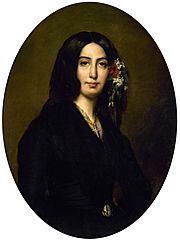Pseudonym facts for kids
A pseudonym (say "soo-do-nim") is a special name a person uses instead of their real name. Lots of people use pseudonyms, like authors who use pen names and performers who use stage names.
People choose pseudonyms for different reasons. Sometimes, they want to keep their real identity a secret. Other times, they might want to hide their gender or background. Performers, like rappers, often pick a pseudonym that fits their stage personality better.
Pseudonyms can be many things, including stage names, pen names, nicknames, aliases, and even superhero identities or code names.
The word pseudonym comes from the Greek word ψευδώνυμον (pseudṓnymon), which means "false name."
Contents
Why People Use Pseudonyms
People use pseudonyms for many reasons, from being creative to staying safe. Let's look at some common types and examples.
Pen Names: Authors' Secret Identities

Authors often use pen names to write their books. This helps them keep their real identity private. Many famous books you might know were written by authors using a pseudonym.
For example, Daniel Handler wrote the popular "A Series of Unfortunate Events" books under the pen name Lemony Snicket. He did this because he wanted the author to be a character in the story. It also helped him keep his real name hidden.
When Susan Eloise Hinton published her famous book, The Outsiders, she used her initials, S. E., instead of her full name. She didn't want readers to guess if she was a boy or a girl.
The Brontë sisters—Anne, Emily, and Charlotte—also used pen names. They wanted to hide that they based many of their characters on people they knew in their village.
Stage Names: Performers' Cool Names
Musicians, actors, and other performers often use pseudonyms called stage names. They might do this to keep their real identity private or to choose a name that sounds "cooler" for their career.
For instance, the famous rapper Sean Combs has used several stage names. He's been known as Puff Daddy, P Diddy, and is currently called Diddy. He once explained that he changed his name to Diddy to "simplify things" and avoid confusion.
Online Usernames: Staying Safe on the Internet
Many people use pseudonyms when they are online. These are often called usernames, user IDs, or handles. These online pseudonyms are super helpful for several reasons.
First, they help people stay anonymous on the internet. This means you can interact online without everyone knowing your real name. Second, they help protect people from identity theft and phishing scams. If you use a fake name, it's harder for bad people to find out who you really are.
When you log into websites like Wikipedia or Facebook, your username helps the site know it's you. It does this without you having to type in your real name. Imagine if everyone had to use their real name! It would be confusing if two people had the same name. Usernames solve this because everyone creates their own unique one. Also, using a username makes it harder for others to guess your passwords or find you in real life.
War Names: Nom de Guerre
Sometimes, people in military or resistance groups use a special type of pseudonym called a nom de guerre (pronounced "nom duh gair"). This French phrase means "war name."
In old France, soldiers joining the army would get a nom de guerre. It was like an official nickname. These names often came from where the soldier was from or a special trait they had. For example, a soldier from a town called Champigny might be called "Jean Deslandes dit Champigny." This helped identify them.
During World War II, members of the French resistance and Polish resistance used noms de guerre for safety. This helped hide their true identities and protected their families from danger. It also helped them separate their normal lives from their secret work.
Some famous people who used noms de guerre include Willy Brandt, who later became the leader of West Germany, and Subcomandante Marcos, a spokesperson for a group in Mexico. Yitzchak Shamir, who later became Prime Minister of Israel, used the nom de guerre "Michael" during his time in an underground group.
Sometimes, leaders of revolutions or resistance movements kept their noms de guerre as their official names after their fight was over. Examples include Lenin, Stalin, and Josip Broz Tito.
Related pages
See also
 In Spanish: Alias para niños
In Spanish: Alias para niños
 | Aaron Henry |
 | T. R. M. Howard |
 | Jesse Jackson |

